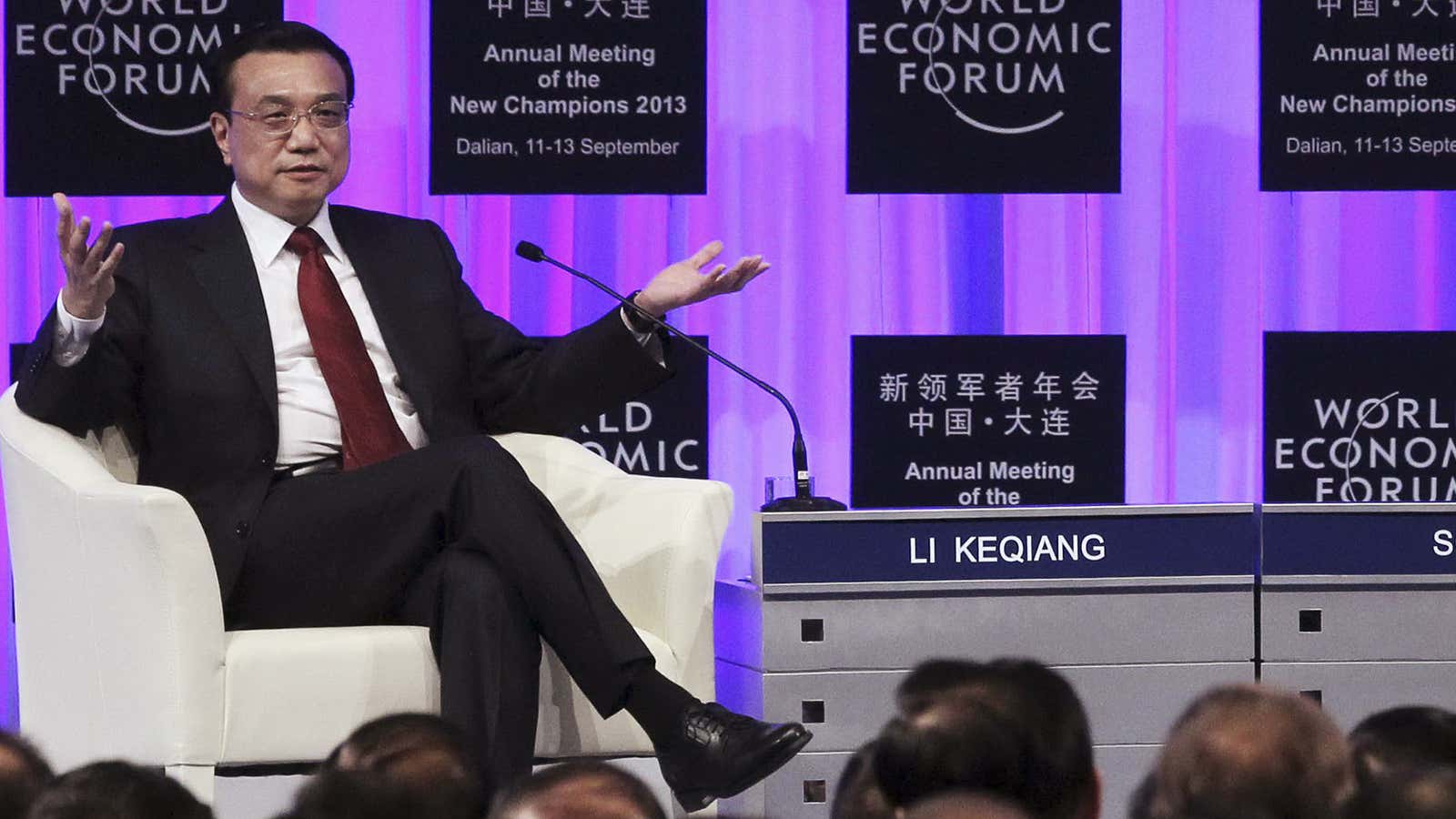Premier Li Keqiang is making all the right noises about making China’s economic growth more sustainable. “Reform remains the driving force,” he wrote in the Financial Times (paywall) on Sept. 8. And in Dalian, China, for “Summer Davos,” he pressed the same theme. Here’s our assessment of Li’s three signature policies that he highlighted today in Dalian:
1. Interest rate liberalization
The problem: The government keeps bank deposit interest rates artificially low, which suppresses household consumption, shifts consumer savings to inefficient state-owned industries, and leads to huge market distortions like the property bubble.
Li’s solution: “We will continue to liberalize interest rates… We eliminated the floor on lending interest rates. This is a step forward in the process of making interest rates market-based, and we will keep moving forward.”
The obstacle: This idea is not popular among powerful state-owned enterprises (SOEs), which will lose their cheap credit as a result. Plus, since Chinese banks are scarcely ready to compete for their deposit base, reform risks major financial sector upheaval.
Chances of success: Not any time soon. Rumor has it that Li pushed for deposit rate liberalization back in July and lost the battle in the State Council to those protecting the SOEs. (Despite his impressive title, Li’s authority isn’t buttressed by as many years of favor-giving as some of his older State Council colleagues.) It’s not likely that Li would again stake his reputation on lifting the deposit rates cap.
2. Competition for state-owned industries
The problem: China’s SOEs—there were 144,700 in 2011—are huge, inefficient, and shrinking. But because they benefit from political patronage, regulatory barriers, oligopoly status, and access to cheap credit and resources, smaller independent competitors don’t stand a chance. And none of this sits well with the public.
Li’s solution: “We want to create a market environment of fair competition. Enterprises of different ownerships should all enjoy fair opportunities and conditions to compete in the market.”
The obstacle: Again, SOE leaders aren’t going to let this happen without an all-out fight.
Chances of success: It depends on how you define SOE reform. Opening up manufacturing sectors like steel, shipbuilding or coal to private competition are relatively low-cost wins; rampant overcapacity in those sectors means privatizing them can only help. But SOEs are still critical levers of economic growth, and many of their leaders still rank as ministers or vice ministers in the Communist Party hierarchy. That will make letting the market set resource prices tricky.
3. No stimulus
The problem: China’s economic model depends on investment to generate growth. As long as credit keeps flowing, it will be very hard to restructure the economy, including reforms like interest rate liberalization and market pricing of resources. The rapid slowdown—and just-as-rapid pickup—of the Chinese economy this summer shows that if the government wants to halt fiscal and monetary stimuli and implement reforms, output will drop.
Li’s solution: Apparently, to assure people that the government eschews stimulating the economy. “When there’s downward pressure on growth, one choice is to adjust economic policy, increase deficits, relax monetary policy,” he said. “That might have a short-term benefit, but may not be beneficial for the future.”
The obstacle: For reasons unclear, China sets GDP growth targets. It’s the only major government to do so. In 2013, China aims for 7.5% expansion. Undershooting, it’s assumed, would hurt the new administration’s credibility.
Chances of success: For “no more stimulus”? Not high. For hitting 7.5% GDP growth in 2013, which Li insists will happen? Very high. If you need any more signs of Li’s disingenuousness on this, look no further than building more railways and advancing “urbanization,” both of them Li’s pet policies. If those aren’t fiscal stimulus, what is?
A very dirty toilet indeed
In his remarks today, Li explained that his leadership now is rooted in his past work as a farmer. ”That experience has helped me a lot as Premier,” he said. “If the managers of this building have the experience of ‘cleaning the toilet,’ I believe they can better manage this complex,” referring to the Dalian International Conference Center.
That may be so. Li clearly knows how dirty the toilet is—and what needs to happen to clean it. But he’s the manager now. And Li doesn’t seem to want to get his hands any dirtier than he has to.




